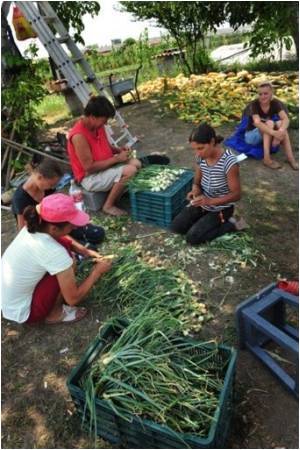One of the most unlikely projects in Nairobi's Kibera slum is being fertilized by crime, poverty and festering raw sewage.

Three months of hard labour in 2008 is what it took the group of around 40 farmers to clear the piece of land, measuring half a hectare (1.2 acres), of its decades-old heap of refuse and transform it into an arable plot.
"We then dug it one metre (yard) deep and brought new soil. Sunflowers were planted to suck up any heavy metals that might have been left," said Erick Ogoro Simba, one of the project leaders.
Last year, the group set up the greenhouse, which lies along the Nairobi-Kampala railway running through Kibera, and have since been able to produce a dozen crates of tomatoes daily as well as other vegetables which they sell to local residents.
"Without the farm, I always think that I would have been dead or in prison or something like that because we have lost most of our friends and brothers in crime," said 25-year-old Victor Matioli.
Kibera residents appreciate buying the vegetables at a cheaper price, but such benefits are only shared within Kenya's biggest slum as well-off Nairobi residents are loath to consume anything grown there.
Advertisement
The farm is run under Youth Reform, a local organisation for young people in Kibera, where it has also built three water tanks and toilets with funding from foreign donors.
Advertisement
"There are some people who are still sceptical. They think it is like a curtain (behind which we are hiding) and that we are still doing bad things," head of farm production Alamin Ibrahim said.
But the group ambitions to inspire and sway other young people from a life of crime remain in focus, and project leader Simba said they planned to convert several slum dumpsites into organic farms.
"In the next five years we'll be engaging with other slums, other communities because our young men have already been trained so we want to use them," Said Simba.
"We want that knowledge to get out there. We have more dumping sites than homes in the slums so we want, if it is possible, to transform other dumping sites into farms."
Former violent robber Hussein Haroun, 25, said he was perturbed to see many teenagers turning to armed robbery as a short-cut to material satisfaction.
"Youth just want Western lifestyle; go to the club, own a car, nice clothes. They find the work we are doing here tedious."
Source-AFP









